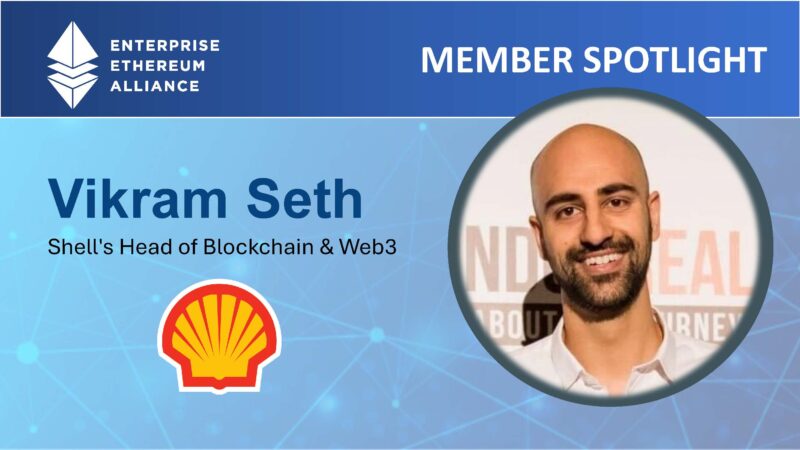[ad_1]

As an EEA member, Shell is part of the EEA community of organizations working to advance Ethereum and drive industry adoption. In the Q&A below, the EEA interviewed Shell’s Head of Blockchain & Web3, Vikram Seth, about how the organization contributes to the Ethereum business ecosystem.
Please introduce your company and yourself (i.e., Vikram)
My name is Vikram Seth. I’ve spent 12+ years in the energy industry, covering commercial, financial, and innovation roles across the energy value chain. My vision is to leverage emerging technologies for a global transition towards a regenerative economy.
In the Blockchain and Web3 team at Shell, we lead several initiatives exploring the application of these technologies to develop new business models to shape the future of the energy sector.
Shell is a global group of energy and petrochemical companies with operations in more than 70 countries – serving more than 1 million commercial and industrial customers and about 32 million customers at 46,000 retail service stations daily.
Shell has been involved in the blockchain space since 2016 and is a founding member of the Energy Web Foundation. We see digital innovation as a key enabler for the energy transition, and we are actively exploring several emerging digital technologies, including AI, Digital Twin, IoT, Metaverse, and, of course, Blockchain.
What first brought you to the EEA, and why did you decide to become a member?
We believe Ethereum and EVM-chains are the gateway to blockchain and Web3 for the business community. At the same time, there are many challenges for genuine business adoption and scale-up of blockchain use cases. Education is a key challenge to bring non-Web3 natives along on the journey, and we are excited to see the EEA address this with its growing network.
The EEA is also well-placed to support the development of global standards, taxonomies, and frameworks for the industrial application of blockchain technology. We need alliances like the EEA to share best practices and success stories and provide direction to help us navigate the business adoption curve.
What are you currently working on with regard to Ethereum? How will end-users benefit from your work?
One area of focus in Shell is developing supply chain traceability solutions to provide trust and transparency in low-carbon energy products as we accelerate the energy transition. These solutions are typically built on Ethereum or EVM-compatible chains.
One example of this is our Avelia platform, which is built on the Energy Web Chain. Avelia aims to bring together airlines, corporates, cargo players, and sustainable airline fuel (SAF) suppliers in a trusted ecosystem to scale the use of SAF and help decarbonize the aviation industry. It provides clear and transparent tracking of the environmental attributes of SAF delivered into the aviation fuelling network.
Another major project that has recently gone live is Falcon, which we co-developed with Wipro and piloted in our operations. Falcon is a platform for industrial supply chain management, which was launched on the Polygon chain. Falcon eliminates the need for a physical paper trail for heavy industrial equipment and uses digital product passports to make data more accessible, auditable, and trustworthy.
How will the EEA enhance your organization’s current efforts?
The EEA can support our journey in Blockchain and Web3 by:
- Increasing awareness for applications of blockchain technology in the energy sector.
- Sharing best practices and key learnings.
- Developing industry standards, particularly with regard to data privacy and security on public blockchains.
What EEA programs are you most excited about?
Along with the networking activities, we are most excited about the Cross-chain interoperability and Ethereum training quality (Eth TQ) working groups.
Cross-chain interoperability is an area of interest for us, particularly to understand how standards are developing and how these might impact the technical standards we adopt.
We are excited to work with the Eth TQ group to bring more understanding, adoption, and better quality solutions to the energy sector.
Learn More and Connect with the EEA:
The EEA enables organizations to adopt and use Ethereum technology in their daily business operations. We empower the Ethereum ecosystem to develop new business opportunities, drive industry adoption, and learn and collaborate. Join us and contribute to our work!
Learn more about EEA membership and contact [email protected].
[ad_2]
Source link